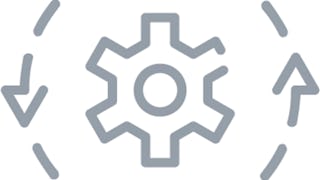This is the third course in the Google Data Analytics Certificate. As you continue to build on your understanding of the topics from the first two courses, you’ll be introduced to new topics that will help you gain practical data analytics skills. You’ll learn how to use tools like spreadsheets and SQL to extract and make use of the right data for your objectives, and how to organize and protect your data. Current Google data analysts will continue to instruct and provide you with hands-on ways to accomplish common data analyst tasks with the best tools and resources.

Prepare Data for Exploration
Seize the savings! Get 40% off 3 months of Coursera Plus and full access to thousands of courses.

Prepare Data for Exploration
This course is part of Google Data Analytics Professional Certificate

Instructor: Google Career Certificates
1,076,526 already enrolled
Included with
23,105 reviews
Recommended experience
What you'll learn
Explain what factors to consider when making decisions about data collection.
Discuss the difference between biased and unbiased data.
Describe databases with references to their functions and components.
Describe best practices for organizing data.
Skills you'll gain
Tools you'll learn
Details to know

Add to your LinkedIn profile
29 assignments
See how employees at top companies are mastering in-demand skills

Build your Data Analysis expertise
- Learn new concepts from industry experts
- Gain a foundational understanding of a subject or tool
- Develop job-relevant skills with hands-on projects
- Earn a shareable career certificate from Google

There are 5 modules in this course
Earn a career certificate
Add this credential to your LinkedIn profile, resume, or CV. Share it on social media and in your performance review.
Instructor

Offered by
Explore more from Data Analysis
 Status: Free Trial
Status: Free Trial Status: Free Trial
Status: Free TrialMicrosoft
 Status: Free Trial
Status: Free Trial Status: Free Trial
Status: Free Trial
Why people choose Coursera for their career

Felipe M.

Jennifer J.

Larry W.

Chaitanya A.
Learner reviews
- 5 stars
82%
- 4 stars
14.67%
- 3 stars
2.37%
- 2 stars
0.47%
- 1 star
0.47%
Showing 3 of 23105
Reviewed on Aug 8, 2021
As a beginner in SQL and Data analyst world, this course "Prepare Data for exploration" open my eyes and enrich my knowledge. I do really enjoy this course. and Excited to move forward. Thank you :)
Reviewed on Aug 8, 2023
I love how the course it's not limited to teach about the technical skills of a data analyst professional, but it also helps you discover some soft skills that make you a better human resource.
Reviewed on Dec 31, 2021
I liked that some assignments had me use SQL and get more comfortable using it. However I would have liked more assignments using SQL and Sheets to get more practice. Otherwise was pretty fun.

Open new doors with Coursera Plus
Unlimited access to 10,000+ world-class courses, hands-on projects, and job-ready certificate programs - all included in your subscription
Advance your career with an online degree
Earn a degree from world-class universities - 100% online
Join over 3,400 global companies that choose Coursera for Business
Upskill your employees to excel in the digital economy

